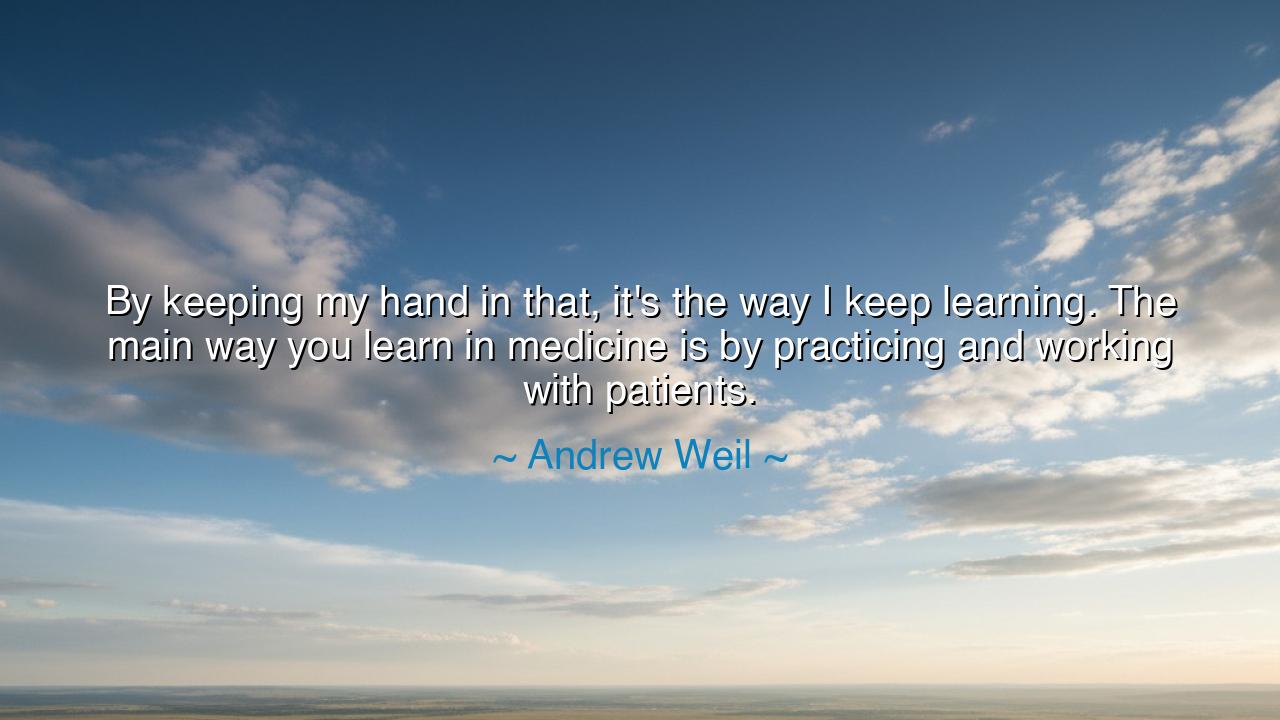
By keeping my hand in that, it's the way I keep learning. The
By keeping my hand in that, it's the way I keep learning. The main way you learn in medicine is by practicing and working with patients.






Hear the words of Andrew Weil, spoken with the humility of a healer who knows the endless depth of his calling: “By keeping my hand in that, it's the way I keep learning. The main way you learn in medicine is by practicing and working with patients.” In this utterance shines a profound truth—not only for physicians, but for all who seek wisdom—that learning is never finished, that mastery is not attained by books alone, and that the path of knowledge is paved by direct encounter with life itself.
To “keep my hand in that” is to remain grounded in practice, to refuse the temptation of resting upon past achievements. In medicine, as in all arts, one cannot withdraw from the living reality and expect to grow. Theories, lectures, and texts may guide the mind, but the heart of learning lies in the work itself. For the healer, this means listening to the cries of the sick, observing the mysteries of the body, and laboring daily in the presence of suffering and recovery. In this, Weil reminds us that true knowledge is not abstraction—it is lived experience.
The ancients knew this truth well. The great physician Hippocrates did not learn solely from scrolls, but by tending to the ill, by watching fevers rise and fall, by observing wounds heal or fester. He declared that medicine was an art grounded in careful observation and constant practice. So too, Andrew Weil speaks from that same lineage: the main way you learn in medicine is by practicing, not by retreating into theory alone. It is the patient, not the book, who is the ultimate teacher.
We may see this reflected in the story of Florence Nightingale, who transformed the practice of nursing during the Crimean War. She was not content to accept the teachings of her time, which often dismissed the importance of cleanliness or air. Instead, she observed her patients directly, tested her ideas through practice, and learned from their suffering. It was this constant engagement with the sick that gave her insights which saved countless lives. Her wisdom did not come from words alone, but from walking among the wounded.
Weil’s words also carry an admonition for all generations: beware the arrogance of believing oneself finished with learning. In every field, those who rest upon their knowledge soon decline, while those who remain students, even in mastery, continue to grow. To practice is to remain humble before the endless complexity of life, to admit that each patient, each challenge, brings a new lesson. This humility is not weakness—it is the wellspring of wisdom.
The lesson is clear: learning is a continual act, fed by practice and direct engagement. For the doctor, this means working with patients. For the artist, it means painting or playing daily. For the leader, it means listening to people and guiding them through real struggles. In all things, theory and intention must be wed to action, or else they wither into lifeless knowledge.
Practical action follows. Do not retreat into pride or complacency, thinking you have learned enough. Keep your hand in the craft you love, remain present with the realities that first called you to it. If you are a student, seek practice as well as study. If you are a master, continue to labor, for only through work do you remain alive to learning. And in every encounter—with patient, with student, with neighbor—see the opportunity to learn anew.
Thus, the words of Andrew Weil endure as a torch for all who seek wisdom: learning lives in practice, and practice lives in service. Books may prepare, but life itself is the true teacher. And so, let each generation remember: to keep learning, keep doing; to keep growing, keep serving; and to keep wisdom alive, remain always a humble student of the living world.






AAdministratorAdministrator
Welcome, honored guests. Please leave a comment, we will respond soon